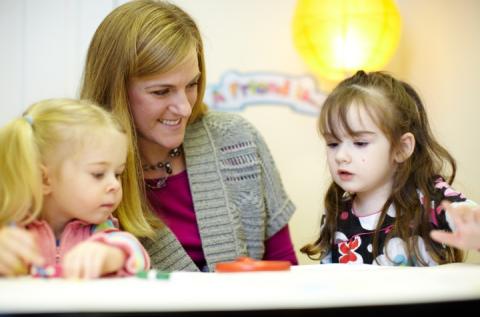The online A.S. in Early Childhood Education provides a thorough understanding of the young child. You’ll build skills to help guide children in their early education and learn about child and family development patterns.
Credit Hours: 60 | | Tuition Cost
Develop Skills to Guide Children in their Early Education
This degree prepares students for a smooth transition to the B.S. in Early Childhood Education with Teacher Licensure, which is available to new students in New Hampshire, Maine, Massachusetts, and Vermont.
Course Highlights
- Foundations of Early Childhood Education
- Creative Arts in Early Childhood Education
- Language and Literary Development
- Health, Safety, and Nutrition in Early Childhood Settings
- Mathematics and Science in Early Childhood Education
- Young Children with Exceptionalities, Birth-Age 8
- Early Childhood Program Administration
…and more!
Why UNH CPS?
- Regionally accredited by the New England Commission on Higher Education, Inc. (NECHE).
- Available fully online with select on-campus courses.
- Affordable tuition.
- Nationally ranked online programs.
- About 89% of our students are transfer students. Making the most of your transfer credits is our specialty.
- Career advising is available to all students and alumni. We also extend this service to those considering their college options.
- Faculty who are subject matter experts and share their real-world expertise, helping you apply what you learn to your personal goals and career.
- We’re experts at assessing credit toward your undergraduate degree – not only from previous college coursework, but also for other college-level knowledge demonstrated outside the traditional classroom.
- Completion of our free, online application for admission
- High school diploma, completion of a high school education in a homeschool setting under state law, or demonstrate high school equivalency.
- Successful completion of one of the following exams will be required for demonstrating high school equivalency: the GED, HiSET, or TASC
Those wishing to continue their education may apply their 60-credit associate degree toward an 120-credit bachelor’s degree. Ask your advisor for details!

iSocial and the Pyramid Model
The UNH College of Professional Studies is proud to support the New Hampshire Department of Education and their iSocial State Personnel Development Grant (SPDG). The goal of this grant is to improve social-emotional outcomes of infants, toddlers and young children with disabilities (birth to age 5) through the implementation of the evidence-based Pyramid Model Framework.
Learn more about the courses and assignments that align to this model.
Curriculum & Requirements
This degree plan is a sample and does not reflect the impact of transfer credit or current course offerings. UNH CPS Online undergraduate students should develop individual academic plans with their academic advisor during their first year at UNH.
Sample Course Sequence
| First Year | ||
|---|---|---|
| Fall | Credits | |
| COM 460 | Interpersonal Communication and Group Dynamics | 4 |
| ENG 420 | The Writing Process | 4 |
| EDC 501 | Foundations of Early Childhood Education | 4 |
| General Education Course | 4 | |
| Credits | 16 | |
| Spring | ||
| CRIT 501 | Introduction to Critical Inquiry | 4 |
| EDC 502 | Creative Arts in Early Childhood Education | 4 |
| MTH 402 or MTH 504 or MTH 510 | Math for Our World or Statistics or Pre-Calculus | 4 |
| PSY 470 | Child Development | 4 |
| Credits | 16 | |
| Second Year | ||
| Fall | ||
| COM 480 | Visual Communication | 4 |
| EDC 503 | Language and Literacy Development | 4 |
| EDC 504 | Health, Safety & Nutrition in Early Childhood Settings | 4 |
| General Education Course | 4 | |
| Credits | 16 | |
| Spring | ||
| EDC 505 | Mathematics and Science in Early Childhood Education | 4 |
| EDC 506 | Young Children with Exceptionalities in Early Childhood Settings | 4 |
| EDC 507 | Early Childhood Program Administration | 4 |
| Credits | 12 | |
| Total Credits | 60 | |
Degree Requirements
Major, Option, and Elective Requirements as indicated.
*Major GPA requirements as indicated.
General Education Program Requirements
A minimum grade of D- is required in all General Education coursework. Students are allowed a maximum of one course overlap between the Major and General Education areas.
| Code | Title | Credits |
|---|---|---|
| ENG 420 | The Writing Process | 4 |
| COM 460 | Interpersonal Communication and Group Dynamics | 4 |
| COM 480 | Visual Communication | 4 |
| CRIT 501 | Introduction to Critical Inquiry | 4 |
| Select one of the following: | 4 | |
MTH 402 | Math for Our World | |
MTH 504 | Statistics | |
MTH 510 | Pre-Calculus | |
| Knowledge of Human Behavior & Social Systems: PSY 470 | 4 | |
| Knowledge of the Physical & Natural World | 4 | |
| Knowledge of Human Thought & Expression | 4 | |
| Total Credits | 32 | |
Major Requirements
A minimum grade of C- is required in all Concentration coursework. Students are allowed a maximum of one course overlap between the Concentration and General Education areas.
| Code | Title | Credits |
|---|---|---|
| Major in Early Childhood Education | ||
| EDC 501 | Foundations of Early Childhood Education | 4 |
| EDC 502 | Creative Arts in Early Childhood Education | 4 |
| EDC 503 | Language and Literacy Development | 4 |
| EDC 504 | Health, Safety & Nutrition in Early Childhood Settings | 4 |
| EDC 505 | Mathematics and Science in Early Childhood Education | 4 |
| EDC 506 | Young Children with Exceptionalities in Early Childhood Settings | 4 |
| EDC 507 | Early Childhood Program Administration | 4 |
| Total Credits | 28 | |
Program Learning Outcomes
- Attain proficiency in basic concepts, theories, and methods in Early Childhood Education.
- Evaluate ethical principles of Early Childhood Education.
- Communicate effectively, both in writing and verbally, with families, children, co-workers and stakeholders in Early Childhood settings.
Your Prior and Current Learning Counts
Many of our students can demonstrate college-level knowledge gained from military, workplace and volunteer-based training, and experiences. We are experts at helping students demonstrate learning and earning academic credit.
